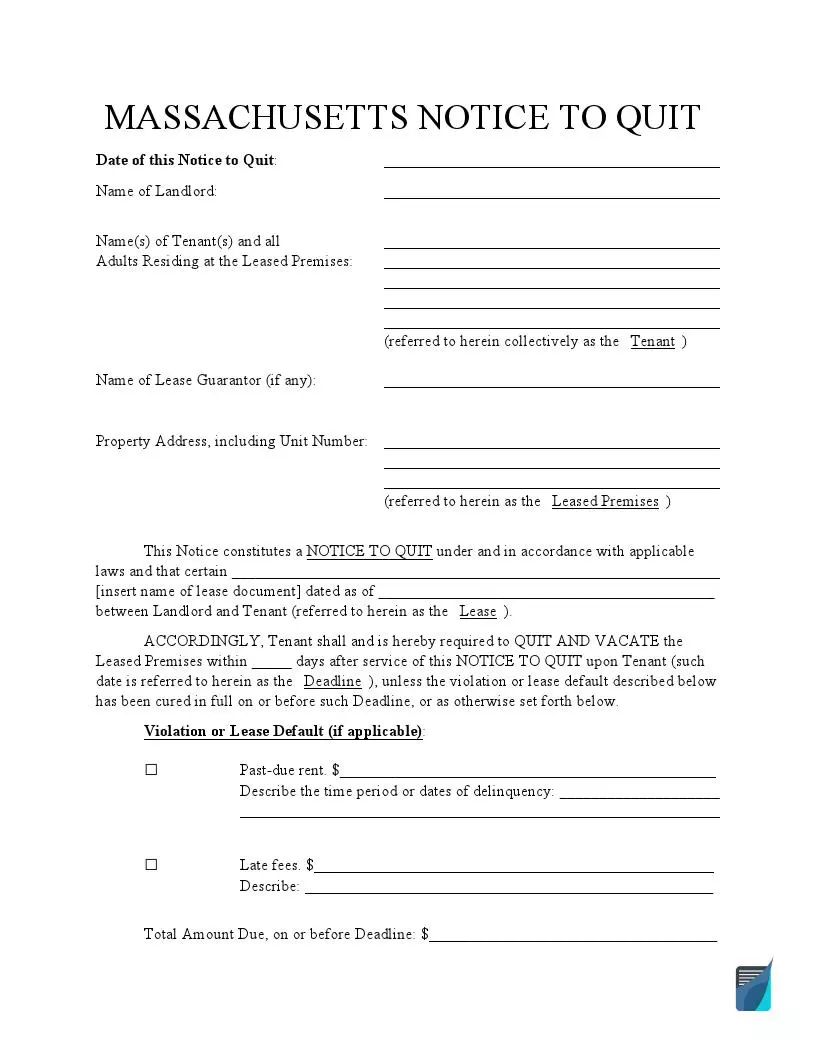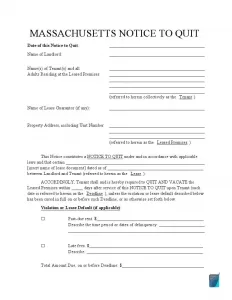Massachusetts Eviction Notice Forms
In the United States, including Massachusetts, when a landlord (or owner) who owns the rented space and a tenant (or renter) who stays at the premises start arguing for some reason or a tenant breaks any condition of the lease agreement, a landlord may start a process of eviction.
For these cases, an eviction notice template is needed. To successfully download one of the Massachusetts eviction notice templates, you can use our form building software.
In this document, an owner has to include particular information like the address of the leased premises, the name of a tenant and an owner, the date when a tenant should move out, and other details. Sometimes a renter may fix the problem and keep staying in the property. However, in some cases, a landlord needs to apply to court: if a tenant is not fixing anything or denying the need for moving out.
Usually, in Massachusetts, there are three reasons that may lead to an eviction for a renter. They include a payment delay, unacceptable behavior of a renter, and a wish of an owner to have his or her real property free from renters. Each of these reasons requires its template of a notice to complete.

Build Your Document
Answer a few simple questions to make your document in minutes
Save and Print
Save progress and finish on any device, download and print anytime
Sign and Use
Your valid, lawyer-approved document is ready
Massachusetts Eviction Laws
To learn about the laws that regulate eviction processes in Massachusetts, one should find Section 32J of Chapter 140 (Title XX, Part I) of the local General Laws. This Section describes basic reasons for a tenant to quit, a period of notification, and other vital information for landlords and renters.
Also, this Section tells that a landlord, in the majority of situations, should send a notice to a tenant no less than 30 days before the eviction date. However, if a renter has not paid rent, he or she will have 15 days to transfer the money since the notice has arrived; otherwise, a landlord may initiate the moving-out process.
Massachusetts Eviction Notice Laws Details
| Rent Grace Period | 30 days |
| Notice of Non-Payment | 14 days |
| Notice of Non-Compliance | Not specified |
| State Laws | Massachusetts General Laws, Chapter 140, Section 32J |
Eviction Notice Types Used in Massachusetts
Commonly, landlords in Massachusetts use three eviction notice templates to warn tenants, including:
30-Day Notice to Quit (for Month-to-Month Lease Agreements)
Sometimes a landlord needs to free the leased properties from renters because he or she has a plan to sell the place or use it for something else. If a landlord and a renter have signed a lease agreement that belongs to the “month-to-month” type, a landlord may send this notice but no less than 30 days before the day of the tenant’s quitting.
14-Day Notice to Quit (for Non-Payment)
In case a renter has considerably delayed the payment or is just not paying at all, an owner can notify them with this document.
30-Day Notice (for Non-Compliance)
If a renter acted inside the leased space in a way that is illegal or inappropriate for an owner, an owner might send this document, asking a renter to leave.

Eviction Process in Massachusetts
If you, as an owner of premises, have decided to ask your tenant to leave in Massachusetts, you should complete several steps. Check out our guide below.
- Send a Notice to a Renter
Your first step would be to send an eviction notice to a renter that occupies your property. Make sure you have chosen the correct template of the document. Also, you should ensure that a renter gets the letter with a form because if he or she does not, you will not be able to conduct an eviction as soon as planned.
- Appeal to Court
If a renter did not react to your notice anyhow, you would start the case in court. To appeal, you will have to gather a couple of documents that we will describe below and pay fees.
- Transfer Documents to a Renter
When you have submitted completed forms to the court, you also have to transmit them to a renter. He or she can respond using a certain form, too, but in a limited period.
Then, before the day when the court will make its decision on your case, a renter may delay a day of moving out by sending a “Discovery” form asking for details and reviewing of papers associated with the case.
- Bring Documents to Sheriff
When the court has made a decision, and you as an owner have won the case, you have to wait for 11 days, get a permit for eviction, and transfer it to the sheriff, who will notify a renter again. A renter will have to leave within 48 hours. Otherwise, a sheriff will make a visit to a renter and force him or her to move out.
Eviction Court Forms
As we have told above, you will need some documents to submit when appealing to the court in Massachusetts. Also, a renter may use certain documents, trying to defend himself or herself from moving out.
The list of used forms in this state is brief and contains:
- Discovery Form
This form may be used by a renter to review the forms that were submitted to the court by an owner. By sending this form, a renter may postpone leaving the premises for no less than two weeks.
- Summons and Complaint Form
If an owner is initiating a case in the court regarding the eviction, this is the form that he or she should submit first. To get the template, an owner has to go to the court in his or her area. When getting a template, a certain fee should be paid by an owner.
- Summary Process Answer Form
If a renter has not agreed with the accusation, he or she may participate in the trial by submitting this document.

Listed here are other Massachusetts forms filled out by our users. Check out our powerful builder to personalize any of these forms to your preferences.
